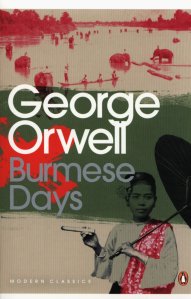It is little to say that George Orwell was a true visionary. Not only was he lucid enough to preach against the dangers to totalitarianism in his famous novel “1984”, but he also eloquently spoke against colonialism during his stay in British Burma, at a time where it was totally trivial to believe in Western superiority and the supremacy of the white “race”.
Burmese days is a masterpiece account of Orwell’s time in Burma as an Officer of the Indian Imperial Police. With his lucid and elegant prose, Orwell describes the life of his peers in the sweaty and heated lands of Burma. He tells with a great sarcasm of the attitude of the British towards the local, as well as the attitude of the locals towards the British who, by dint of hearing that they were inferior and non-civilized, ended up believing that they were indeed inferior and non-civilized.
Burmese Days is also a tragic love story. Flory, a British officer stationed for almost a decade in Burma lives a life of debauchery, filled up with alcohol in early mornings, Burmese prostitutes and eternal boredom. His whole life perspective changes with the coming of Elizabeth, the niece of a British fellow. He falls in love with her, not because she is the one or because it is destiny, but because she is the only decent women in miles around. Elizabeth is not particularly beautiful, or particularly smart. On the other hand, she is highly untolerant of locals, Indians, Chinese, and anything that is not white and British. She had the most despicable attitude towards local customs and she despises anyone who attempts to put white and non-white on the same level. Flory is among these very few British with an admiration for the local and who emphasizes difference rather than superiority.
The novel is both entertaining and thought provoking because it sets one back to the not so old times of colonialism and “civilizing missions” philosophy, and gives you an insight on the cohabitation of locals and British in a remote area of Burma. It describes the persisting (but not so obvious) dynamics of civilized-noncivilized, superior-inferior, white-nonwhite.
George Orwell is a true genius and his prose is so much pleasure to read, here are some of the gems collected from one of his most under-rated novels, Burmese Days:
“It is devilish to suffer from a pain that is all but nameless. Blessed are they who are stricken only with classifiable diseases! Blessed are the poor, the sick, the crossed in love, for at least other people know what is the matter with them and will listen to their belly-achings with sympathy. But who that has not suffered it understands the pains of exile?”
“There is nothing like an earthquake for drawing people together. One more tremor, or perhaps two, and they would have asked the butler to sit down at table with them.”
“Beauty is meaningless until it is shared.”
“A dull, decent people, cherishing and fortifying their dullness behind a quarter of a million bayonets.”
“. . . it is a corrupting thing to live one’s real life in secret. One should live with the stream of life, not against it.”

